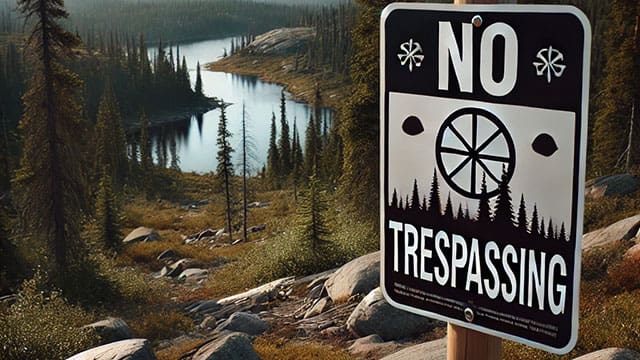Rest assured, they will be back if the B.C. NDP is re-elected
By Geoffrey Moyse
Not too long ago, the BC NDP tried to introduce amendments to the B.C. Land Act that stirred significant public opposition. To remind you of the issue, here’s a key point from a commentary by a senior legal counsel at McMillan LLP:
“Under the proposed amendments by the B.C. government, agreements with Indigenous groups would give them veto power over decision-making regarding Crown land tenures and/or joint decision-making authority with the Minister. In such cases, the Crown would no longer have the sole authority to make decisions about Crown land in the public interest.”
Understandably, there was significant public backlash to these proposed changes in how decisions about B.C.’s Crown (public) lands would be made in the future.
But let’s step back and examine the source of these proposed amendments.
In previous writings, I discussed DRIPA – the province’s Declaration on the Rights of Indigenous Peoples Act – which was passed unanimously in 2019.
Section 7 of DRIPA states:
“For the purposes of reconciliation, the Lieutenant Governor in Council may authorize a member of the Executive Council, on behalf of the government, to negotiate and enter into an agreement with an Indigenous governing body relating to one or both of the following:
- The exercise of a statutory power of decision jointly by the Indigenous governing body and the government or another decision-maker;
- The consent of the Indigenous governing body before the exercise of a statutory power of decision.”
In simple terms, Section 7 authorizes the B.C. government to enter into agreements with Indigenous governing bodies, allowing decisions about the use of Crown land to be made jointly or requiring the consent of Indigenous groups before any decisions are made.
It’s important to note that, like the recent Haida title recognition legislation, DRIPA may be unconstitutional for singling out Indigenous groups under the 1867 Constitution Act. I understand a constitutional challenge has already been filed.
So, what’s the real origin of Section 7?
Article 18 of UNDRIP (U.N. Declaration on the Rights of Indigenous Peoples) states: “Indigenous peoples have the right to participate in decision-making in matters which would affect their rights, through representatives chosen by themselves in accordance with their own procedures.”
But what does “participate in decision-making” mean? UNDRIP’s language is vague and open to interpretation.
This phrase could be understood as either a right to joint decision-making or the right to be fully and meaningfully consulted before government decisions that affect Indigenous rights are made. The latter interpretation aligns with the 2004 Haida decision by the Supreme Court of Canada.
However, B.C.’s current government has chosen to interpret this as a right to joint decision-making, which is inconsistent with Canadian case law.
What about Indigenous consent before government decisions can proceed, as outlined in Section 7 of DRIPA? Article 32(2) of UNDRIP states: “States shall consult and co-operate in good faith with the indigenous peoples concerned through their own representative institutions in order to obtain their free and informed consent prior to the approval of any project affecting their lands or territories and other resources.”
This, again, is inconsistent with Canadian constitutional case law. The Supreme Court of Canada has not made such a ruling.
So, what’s the bottom line?
The B.C. The NDP government has chosen to prioritize UNDRIP over Canadian constitutional law in several aspects of DRIPA. This is why the B.C. Land Act amendments were proposed, and it is also why we can expect these amendments to be reintroduced if the government is re-elected.
For this government, UNDRIP seems to take precedence over Canada’s constitutional framework.
Geoffrey S. Moyse KC is a retired senior lawyer who served as legal counsel to the Province of B.C., advising six successive governments on Aboriginal law over more than 30 years.
For interview requests, click here.
The opinions expressed by our columnists and contributors are theirs alone and do not inherently or expressly reflect the views of our publication.
© Troy Media
Troy Media is an editorial content provider to media outlets and its own hosted community news outlets across Canada.

